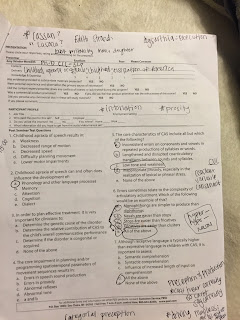(a)“I, Sarah Morales, affirm that I completed my independent component which represents 32 hours of work.”
(b) Cite your source regarding who or what article or book helped you complete the independent component.
- Meredith-Skinder,Amy.Ph.D,CCC-SLP."Childhood Apraxia of speech: Differential Diagnosis & Treatment."PESI.2015.Seminar.
- Barron,Sean, Temple Grandin, Raun Mehmed."Play Therapy."CMI.2015.Seminar.
- Collins,Shannon MA, CCC-SLP, Angela Sterling-Orth MS, CCC-SLP."Evidence-based iPad Interventions for Speech-Language & Special Education Services."PESI.2014.Seminar.
- Rogers,Gordy M.S, CCC-SLP."Beyond Traditional Articulation Therapy."CMI.2012.Seminar.
- Siciliano,Linda B.A, CCC-SLP."Multi sensory Interventions for Speech, Languages and Early Literacy."PESI.2015.Seminar.
- Morris,Rick O.D,P.A., FCOVD."Visual Processing Therapy."PESI.2013.Seminar.
- Yaruss,J. Scott, Ph.D, CCC-SLP ,ASHA Fellow."Practical Treatment Strategies for School-Age Children Who Stutter."Pesi.2010. Seminar
Grading Criteria
(d) Explain what you completed.
- I watched 32 hours worth of continuing education seminars. These videos are watched by therapist every year and they must take post-seminar test and send them in to get graded to ensure that the therapist are keeping up with the continuing education. These seminars are on updated information and new discoveries and continuously provide different perspectives so that the therapist never get rusty with their approach of helping a client.
(e) Defend your work and explain the component's significance and how it demonstrates 30 hours of work. Provide evidence (photos, transcript, art work, videos, etc) of the 30 hours of work.
Although I didn't take the test to get sent in, I did take the test to show that I followed along and paid attention to the seminar. I also took side notes and wrote down ideas as well.
*Below are pictures of the post-seminar test i had to take with* each seminar. This is the one for Childhood Apraxia of Speech.
*Below are pictures of what the cd's look like*
and a picture of me watching the seminar and filling out the test.
 |
| (In the package) |
 |
| (Me, watching the seminars) |
*Below I tried to upload snippets of seminars but* blogger is really bad at loading videos.
(f)How did the component help you answer your EQ? Please include specific examples to illustrate how it helped.
- The component helped defend the answers I already have as well as give me ideas of army third answer that I have been struggling with. For example, during the seminar for Childhood Apraxia of Speech, the presenting SLP described how family/parent involvement helps motivate the client to try which gets a better outcome and faster progress. Another example is, for my answer three I could make it "Stay up to date with rtechincolgical advancements" and explain how the I-Pad has changed the way SlP's work with their client. How The I-pad is an "office in a box" and has all the SLP's speech materials as well as they schedule. The videos just help my general knowledge of speech expand as well as helping me target specific ares of my answers for my EQ.






